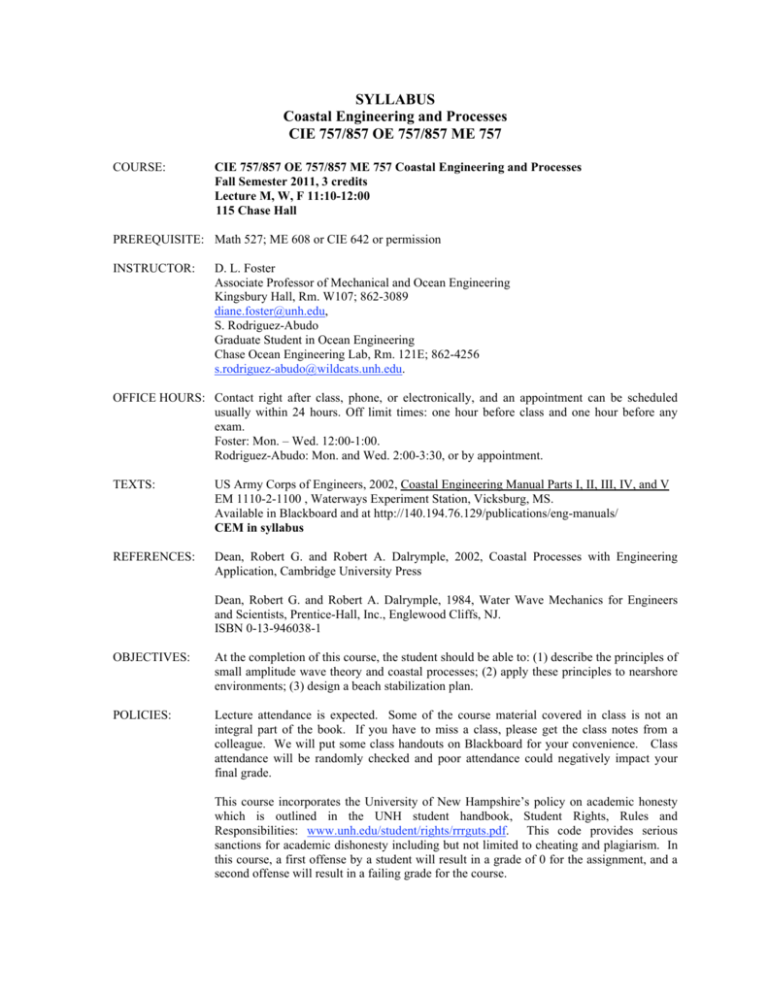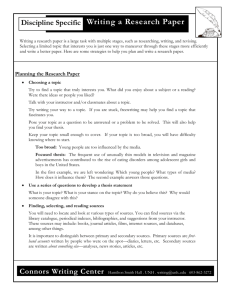SYLLABUS Coastal Engineering and Processes CIE 757/857 OE
advertisement

SYLLABUS Coastal Engineering and Processes CIE 757/857 OE 757/857 ME 757 COURSE: CIE 757/857 OE 757/857 ME 757 Coastal Engineering and Processes Fall Semester 2011, 3 credits Lecture M, W, F 11:10-12:00 115 Chase Hall PREREQUISITE: Math 527; ME 608 or CIE 642 or permission INSTRUCTOR: D. L. Foster Associate Professor of Mechanical and Ocean Engineering Kingsbury Hall, Rm. W107; 862-3089 diane.foster@unh.edu, S. Rodriguez-Abudo Graduate Student in Ocean Engineering Chase Ocean Engineering Lab, Rm. 121E; 862-4256 s.rodriguez-abudo@wildcats.unh.edu. OFFICE HOURS: Contact right after class, phone, or electronically, and an appointment can be scheduled usually within 24 hours. Off limit times: one hour before class and one hour before any exam. Foster: Mon. – Wed. 12:00-1:00. Rodriguez-Abudo: Mon. and Wed. 2:00-3:30, or by appointment. TEXTS: US Army Corps of Engineers, 2002, Coastal Engineering Manual Parts I, II, III, IV, and V EM 1110-2-1100 , Waterways Experiment Station, Vicksburg, MS. Available in Blackboard and at http://140.194.76.129/publications/eng-manuals/ CEM in syllabus REFERENCES: Dean, Robert G. and Robert A. Dalrymple, 2002, Coastal Processes with Engineering Application, Cambridge University Press Dean, Robert G. and Robert A. Dalrymple, 1984, Water Wave Mechanics for Engineers and Scientists, Prentice-Hall, Inc., Englewood Cliffs, NJ. ISBN 0-13-946038-1 OBJECTIVES: At the completion of this course, the student should be able to: (1) describe the principles of small amplitude wave theory and coastal processes; (2) apply these principles to nearshore environments; (3) design a beach stabilization plan. POLICIES: Lecture attendance is expected. Some of the course material covered in class is not an integral part of the book. If you have to miss a class, please get the class notes from a colleague. We will put some class handouts on Blackboard for your convenience. Class attendance will be randomly checked and poor attendance could negatively impact your final grade. This course incorporates the University of New Hampshire’s policy on academic honesty which is outlined in the UNH student handbook, Student Rights, Rules and Responsibilities: www.unh.edu/student/rights/rrrguts.pdf. This code provides serious sanctions for academic dishonesty including but not limited to cheating and plagiarism. In this course, a first offense by a student will result in a grade of 0 for the assignment, and a second offense will result in a failing grade for the course. Academic accommodations will be developed in accordance with UNH policies. Consult Disability Services at: http://www.unh.edu/disability services/disabilityservices.html No make-up exams will be given. In extenuating circumstances the instructors may provide an alternative exam that could have an oral format. Mobile phone, texting, and pager use is distracting and is prohibited in lecture. Should you need to use such devices, excuse yourself from the room. GRADING*: Homework/Quizzes: 20% Midterms: 30% Project: 20% Final 30% Total 100% *The instructors may adjust the final course grades (e.g. + or -) based upon class participation and other extenuating factors. GRADING SCALE: A + HOMEWORK: 93-100 90-92 B 87-89 83-86 80-82 C 77-79 73-76 70-72 D 67-69 63-66 60-62 F <60 Homework is due one week after it is assigned, at the beginning of class, not later in the day. Late homework will not be accepted, and a zero will be given for that assignment, unless there is a valid reason and you talk with one of the instructors before class. Discussion of homework problems between classmates is encouraged and is not considered academic dishonesty. However, the direct copying of homework or the exchange of any computer files is forbidden. In order to facilitate the grading of submitted homework assignments, the following must be adhered to: 1. Every page should have your name written at the top of the page. The first sheet of your work shall have this information across the top: Course No./Course Title/H.W. Set No./Name (last, first) 2. All work is to be submitted written on one side of the paper, with clean erasures (not scratched out work). Keep problems in the order assigned and separate each problem by a heavy line across the entire sheet. Identify answers by underlining or boxing. 3. A neat, labeled sketch of the problem setup should be included. The assumptions made for each problem must be clearly stated. Label all plots completely as to title and axes, including dimension and scales. 4. Include the proper complete units associated with the quantities calculated. Use the standard nomenclature of the S.I. or English system unless others are specified. QUIZZES: In-class quizzes may be given upon occasion. Most will be announced, although unannounced quizzes may be given throughout the semester depending on class attendance, homework, and level of understanding of the material. Quizzes, if any, will generally consist of a problem similar to what was done in class or given as homework. BLACKBOARD: Course information, assignments and grades will be uploaded to the Course Blackboard site at http://blackboard.unh.edu.





